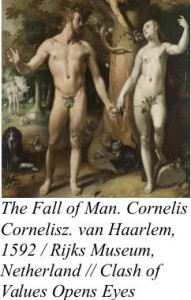I publish here various culture related materials. Of course, the site is devoted to a book but the book is titled “Culture vs. Copyright.” So, even formally, my culture related posts are quite justified. As for essence, one of the main conclusions in the book is that you cannot “deal with culture” as with material properties. That is plain silly. All I post here is to get you feel that culture is “different.” Maybe, I hope, some pro-copyright, pro-patent, etc. enthusiasts one day will see the problem, at least… The below happened after a Post-Existential Philosophy club meeting a few days ago.
We did “slow reading” this time. Which is, in my view, philosophy reading. I would say “reading” for you cannot “read” philosophy – she requires thinking, discussing, working out, coming back… No, you cannot “read philosophy” – that would be just waist of time. Fiction can or even must be read – there you need to get involved. You stop for moment to think of something and you fall out of the story. Philosophy is just the opposite. So, we did it as slow as possible. Three paragraphs in an hour and half. Three short paragraphs, barely half page of the Diary in Sartre’s Nausea.
What does Sartre say there? In very general terms – things are getting independent and deceiving. They use every opportunity to pretend they are not what they used to be: a door knob turns into undistinguished cold object, a fork wants to be peaked up in some other way it used to be, face of an acquaintance pretends to be not a face and when gets caught turns into some unfamiliar one, a hand pretends to be a white worm… The man whom things play with makes an effort to put them in place and they obey but the effort is needed… And he doesn’t know what’s wrong: whether it’s him who’ve changed or it’s things, actually all things (the phenomenon expands) change their ways?
What’s the point? We don’t know yet where Sartre intents to lead us but he already made us think (it’s actually him plus our slow reading). And thinking I am going to indulge myself with.
First, how relevant is the question who is sick here: the man or the world? The question makes no sense for the man – what’s happening is happening, no matter how to interpret it.
Well, Kant would concur – yes we never know what “thing in itself” is for all we can do is to deal with a phenomenon as it is. But we can experiment, put things in specifically arranged circumstances, make them deal with one another and thus determine what they are.
Does Sartre have anything to answer? I believe he does. If things pretend to be not what they are how then can we conduct an accurate experiment? Furthermore, what will be an output? How to interpret it? Let Kant to think for now – there are other interlocutors.
Aristotle, most probably, wouldn’t pay attention to Satre’s sickness, for for him it would be nothing more than that. But he wouldn’t give Kant so easy time. What is this thing in itself? Something deep inside, what we cannot deal with? No way, what is “inside” is “inner form” which makes thing what it is despite all its fluid appearances and what you translate as “essence.” Your essence is inner form and it is the most definite and certain “thing.” Appearance, yes, of course, may deceive you. No wonder (now he turns Sartre) that man got lost – he doesn’t go after inner form, that is – does not deploy “nus” – his mind while senses can fool you, no questions about that. Uh, this is where the problem is – our hero is not sick, he is just a fool relying entirely on senses.
What else one may rely on? – Sartre goes. Imagination? For imaginary things they are both – your inner form or essence, revered Aristotle or your thing in itself, no less revered Kant. I cannot see them. I cannot deal with them. Thus they are of no use for me. And yes, I don’t know what things are, although they are what I definitely deal with. I don’t know how they are what they are – this is true but this is how it is. I didn’t mistake that hand for a worm, it seemed that but I fixed that. Don’t ask me how – I don’t know, I just relay to the fact as it is, for me. And not for me only, by the way. Many people knew the same guy (whom I could not recognize for a few seconds), called him the same name, shared impressions about him with one another. How it works? I don’t know but it does and I state just that…
Well, you can definitely keep this for a true fact but the only definite aspect in your assertion is that you know something… Even though that something may very well deceive you and actually it does… Uh, here is Descartes, of course.
Wait, Sartre says. I agree – the only certain truth is that I do perceive something. That grants me existence, thank you very much. But please, there is some certainty in all those uncertainties and deception, it sure is. I acknowledge – I don’t know how it works but it does. Do we or do we not understand how it works it doesn’t matter, let’s just be plain honest and recognize the fact: even if and when things pretend to be what they are not we manage to hold them accountable, put them in place and have them reveal what they are…
OK, let’s stop here, for now 

